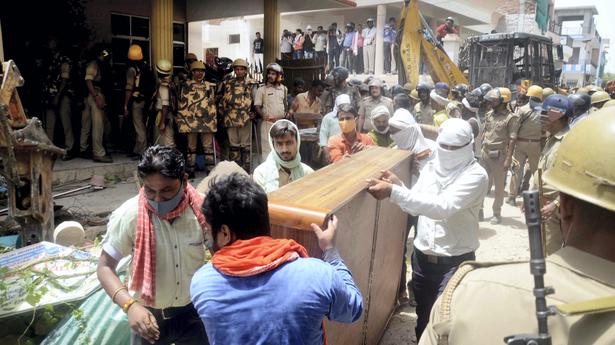
Plea urges Supreme Court to step in to prevent U.P. demolitions
The Hindu
Jamiat says officials violating ‘rule of law’ by using bulldozers to raze homes of people linked to riots
A prominent Muslim body on Monday urged the Supreme Court to step in against officials in Uttar Pradesh who have violated the “rule of law” by using bulldozers to raze the homes of people linked to riots which broke out in the State following objectionable remarks allegedly made by two now-sacked BJP functionaries against Prophet Muhammed.
“The demolition of properties by the State government in retaliation was in breach of the laws enacted by the State legislature itself,” Jamiat Ulama-i-Hind, represented by advocate Kabir Dixit, argued.
Section 10 of the Uttar Pradesh (Regulation of Building Operations) Act of 1958 mandates that a building should not be demolished without giving the affected parties “a reasonable opportunity of being heard”. Section 27 of the Uttar Pradesh Urban Planning and Development Act, 1973 required the affected person to be heard and given 15 days’ prior notice before proceeding with the demolition. Besides this, the Act allowed a person aggrieved with the order of demolition entitled to appeal within 30 days.
The petition submitted that the threat of demolition of private properties had been given by State officials, including the Chief Minister in Uttar Pradesh, after riots broke out in Kanpur following “some offensive remarks made by two political leaders of the ruling party at the Centre and the State”.
“Following the protests and riots in Kanpur, the Chief Minister, the Additional Director General (Law and Order) and the Commissioner of Police of Kanpur had told reporters that the properties of accused persons would be seized and demolished,” it said.
The Jamiat alleged that the authorities began to demolish the houses without even giving these people an opportunity to be heard. The petition asked the court to direct initiation of action against officials responsible. It urged the court to direct the authorities to stop any further demolition from being carried in violation of the due process of law.

“Writing, in general, is a very solitary process,” says Yauvanika Chopra, Associate Director at The New India Foundation (NIF), which, earlier this year, announced the 12th edition of its NIF Book Fellowships for research and scholarship about Indian history after Independence. While authors, in general, are built for it, it can still get very lonely, says Chopra, pointing out that the fellowship’s community support is as valuable as the monetary benefits it offers. “There is a solid community of NIF fellows, trustees, language experts, jury members, all of whom are incredibly competent,” she says. “They really help make authors feel supported from manuscript to publication, so you never feel like you’re struggling through isolation.”

Several principals of government and private schools in Delhi on Tuesday said the Directorate of Education (DoE) circular from a day earlier, directing schools to conduct classes in ‘hybrid’ mode, had caused confusion regarding day-to-day operations as they did not know how many students would return to school from Wednesday and how would teachers instruct in two modes — online and in person — at once. The DoE circular on Monday had also stated that the option to “exercise online mode of education, wherever available, shall vest with the students and their guardians”. Several schoolteachers also expressed confusion regarding the DoE order. A government schoolteacher said he was unsure of how to cope with the resumption of physical classes, given that the order directing government offices to ensure that 50% of the employees work from home is still in place. On Monday, the Commission for Air Quality Management in the National Capital Region and Adjoining Areas (CAQM) had, on the orders of the Supreme Court, directed schools in Delhi-NCR to shift classes to the hybrid mode, following which the DoE had issued the circular. The court had urged the Centre’s pollution watchdog to consider restarting physical classes due to many students missing out on the mid-day meals and lacking the necessary means to attend classes online. The CAQM had, on November 20, asked schools in Delhi-NCR to shift to the online mode of teaching.









